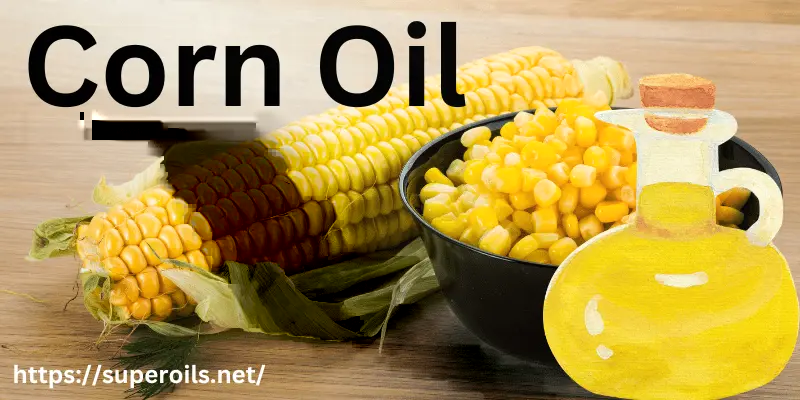Corn Oil: Your Guide to Smart Cooking Practices Today
Published: 12 Jan 2025
Corn oil is a popular cooking oil made from the germ of corn kernels. It’s widely used in households and kitchens due to its mild flavor and versatility. With a high smoke point, corn oil is ideal for frying, baking, and sautéing. It’s also rich in vitamin E and essential fatty acids, making it a nutritious option for many.
What is Corn Oil?
Corn oil became popular in the early 20th century after it was discovered that the oil extracted from corn kernels had a mild flavor and high smoke point, making it ideal for cooking. Today, corn oil is a widely used vegetable oil, extracted from the germ of corn. It is known for its light taste and versatility in various cooking methods, such as frying, sautéing, and baking.

Rich in essential fatty acids and vitamin E, corn oil continues to be a popular and affordable option in kitchens worldwide. To learn about other types of oils, you can explore this guide.
Nutritional Value of Corn Oil
The nutritional value of corn oil comes from its content of essential fatty acids, mainly polyunsaturated fats, including omega-6 fatty acids. It is also a good source of vitamin E, which acts as an antioxidant. While it is high in calories, corn oil provides heart-healthy fats that can help maintain cholesterol levels when consumed in moderation. However, it contains little to no carbohydrates or protein.
Health Benefits of Corn Oil
Corn oil offers several health benefits, mainly due to its rich content of healthy fats and antioxidants. When used in moderation, it can support heart health and provide essential nutrients to your diet.
Benefits:
- Supports heart health by improving cholesterol levels.
- Rich in vitamin E, which acts as an antioxidant.
- Helps reduce the risk of heart disease when used in place of unhealthy fats.
- Promotes healthy skin due to its fatty acid content.
- May help lower inflammation in the body.
How to Use Corn Oil in Cooking
To use corn oil in cooking, start by selecting the appropriate method for the dish you’re preparing. Due to its high smoke point, corn oil is ideal for high-heat cooking methods like frying, sautéing, and deep frying. It can also be used for baking, grilling, or as a base for dressings and marinades. When frying, make sure to heat the oil to the right temperature to achieve the desired crispness without overcooking the food.
The key to effectively using corn oil is to measure the right amount for the recipe. Overusing oil can result in greasy food, while underusing it can lead to uneven cooking. Ensure the oil is heated evenly, and if frying, maintain a consistent temperature to avoid burning the oil. Once done, let the food drain on a paper towel to remove excess oil and enjoy a healthier, delicious meal.
Is Corn Oil Healthy?
Corn oil can be considered healthy when used in moderation, as it contains essential fatty acids like omega-6 and vitamin E, which are beneficial for the body. However, its high omega-6 content, if consumed in excess, may contribute to an imbalance in the body’s fat ratio, which could potentially lead to inflammation. For optimal health benefits, it is important to balance corn oil with other healthy fats and use it in moderation.
Conclusion
So guys, in this article, we’ve covered corn oil in detail. It’s clear that corn oil offers a variety of benefits when used correctly. I recommend adding it to your cooking routine, especially for high-heat recipes like frying or grilling. Take the first step and experiment with corn oil in your next meal. Don’t forget to check out our other informative posts for more kitchen tips, like the cooking oils guide and types of oils!
FAQs
Can Corn Oil Help Lower Cholesterol?
Corn oil contains polyunsaturated fats, which can help improve cholesterol levels when used in moderation. It may also reduce the risk of heart disease. However, balancing it with other healthy fats is important.
Is Corn Oil Good For Skin?
Yes, corn oil can be beneficial for skin health because it contains vitamin E. Vitamin E helps protect skin cells and keeps the skin moisturized. You can use it in skincare products or as a massage oil.
Does Corn Oil Contain Trans Fats?
Corn oil is naturally free from trans fats. However, processed versions may contain trace amounts of trans fats. It’s best to check the label to be sure.
How Can I Store Corn Oil?
Store corn oil in a cool, dark place away from direct sunlight. Keep it tightly sealed to maintain its freshness. Proper storage helps prevent the oil from becoming rancid.
Is Corn Oil Safe For People With Allergies?
Corn oil is generally safe for most people, but those with corn allergies should avoid it. If you have concerns, consult with a healthcare professional before using corn oil. Always check for any allergic reactions when trying a new product.
Can Corn Oil Be Used In Baking?
Yes, corn oil can be used in baking as a substitute for butter or other oils. It works well in recipes that require oil, providing a light texture. It’s especially great in cakes and muffins.
